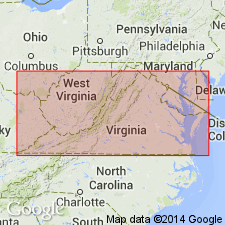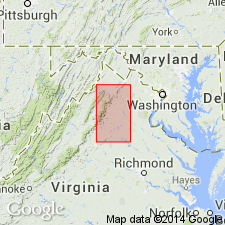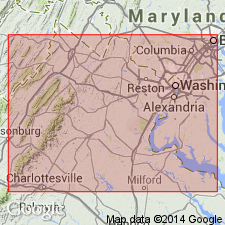
- Usage in publication:
-
- White Oak Alkali Feldspar Granite
- Modifications:
-
- First used
- Dominant lithology:
-
- Granite
- AAPG geologic province:
-
- Piedmont-Blue Ridge province
Summary:
Tollo and Arav (in press) propose that Robertson River Formation of Allen (1963) be revised as Robertson River Igneous Suite to emphasize the lithologic diversity that characterizes this belt. Rocks range in composition from alkali syenite to alkali feldspar granite to granite. This suite is the largest group of intrusives within the Blue Ridge province of VA. Extends from near Upperville, 70 mi southwest to northern suburbs of Charlottesville. Includes at least nine mappable lithologic units, among them, the White Oak Alkali Feldspar Granite (Lowe, 1990: George Washington Univ. unpublished thesis). Unit occurs only in the southern segment of the Robertson River outcrop belt. Composed of coarse-grained, amphibole-bearing alkali feldspar granite, and locally, a fine-grained variety of the same mineralogy. Unit has been traced from its type locality on the Robinson River, discontinuously southward for 13 mi.
Source: GNU records (USGS DDS-6; Reston GNULEX).

- Usage in publication:
-
- White Oak Alkali Feldspar Granite*
- Modifications:
-
- Named
- Dominant lithology:
-
- Granite
- AAPG geologic province:
-
- Piedmont-Blue Ridge province
Summary:
Recent detailed mapping and petrologic analysis indicate rocks previously assigned to Robertson River Formation include a series of granitoids, syenitoids, and felsites emplaced sequentially during 30 m.y. episode of magmatism. Collectively, the rocks form a dike-like mass of intrusions extending nearly 100 km from vicinity of Charlottesville, VA to north-northwest of Ashby Gap, VA. Therefore, name is revised to Robertson River Igneous Suite. At least 8 units of the suite are distinguishable by mineral composition, texture, bulk chemical composition, and U-Pb-determined isotopic age, and can be mapped at 1:24,000 scale. White Oak Alkali Feldspar Granite is named for White Oak Run. Type locality is large roadcut on east side of VA Hwy 638, approx 0.24 km (0.15 mi) northeast of bridge crossing Robinson River, 0.6 km (0.4 mi) northeast of confluence of Glebe Run and White Oak Run, Brightwood 7.5-min quad, central VA. Consists of white to light-gray, fine-grained, amphibole-bearing alkali feldspar granite. Finer grained variety usually cuts coarser grained variety (Lowe, 1990). Contacts with adjacent rocks not exposed. Age is Late Proterozoic. Report includes geologic map.
Source: GNU records (USGS DDS-6; Reston GNULEX).

- Usage in publication:
-
- White Oak Alkali Feldspar Granite*
- Modifications:
-
- Geochronologic dating
- AAPG geologic province:
-
- Piedmont-Blue Ridge province
Summary:
U-Pb zircon age for White Oak Alkali Feldspar Granite is 724+/-3 Ma.
Source: GNU records (USGS DDS-6; Reston GNULEX).
For more information, please contact Nancy Stamm, Geologic Names Committee Secretary.
Asterisk (*) indicates published by U.S. Geological Survey authors.
"No current usage" (†) implies that a name has been abandoned or has fallen into disuse. Former usage and, if known, replacement name given in parentheses ( ).
Slash (/) indicates name conflicts with nomenclatural guidelines (CSN, 1933; ACSN, 1961, 1970; NACSN, 1983, 2005, 2021). May be explained within brackets ([ ]).

